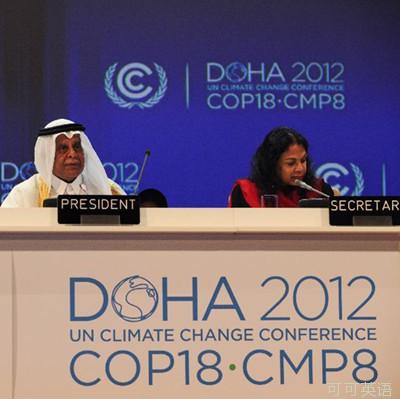(单词翻译:单击)
If you were born after April 1985 you have never lived through a month that was colder than average. What's behind 27 years of warmth? Rising levels of greenhouse gases. Since the 18th century our fossil fuel burning and other activities have added more than 375 billion metric tons of carbon to the atmosphere. And we add still more each year. 2011 set another record for greenhouse gas emissions, according to the World Meteorological Organization.
如果你出生在1985年4月以后,那么你还从未经历过真正寒冷的一个月。在这27年温暖的背后是什么?温室气体的不断增多。自18世纪以来化石燃料的燃烧以及人类的其他活动向大气排放了3750多亿公吨碳。而且每年的排放量都在增加。据世界气象组织报告,2011年又创下温室气体排放的记录。

In the ongoing bid to change that trend, the world's nations are gathering in Doha, Qatar, over the next two weeks. Last year in Durban, South Africa these countries agreed to craft a globally binding treaty to limit greenhouse gas pollution by 2015.
为了改变这一趋势,世界各个国家将在卡塔尔多哈展开为期两周的会议。去年在南非的德班,这些国家同意起草一份全球气候条约,以在2015年控制温室气体的污染。
But, obviously, there is a big gap between pledged pollution reductions and reality. And having the negotiations in a country that makes its living from selling oil and gas seems odd if the goal is to reduce emissions from burning fossil fuels. It remains to be seen if the world can overcome this fossilized inertia. But if we don't, even the great grandchildren of today's youth may blame us for a planetary thermostat set to ever hotter.
然而很明显,比起宣誓要减少污染,实际实行起来要困难许多。在一个靠出产石油和天然气为主要生活来源的国家协商如何减少温室气体的排放似乎显得很奇怪。世界能否克服这一僵局,仍有待观察。如果不能,恐怕这一代年轻人们的子孙就会因地球温度太高而责怪我们了。
原文译文属可可原创,未经允许请勿转载!


